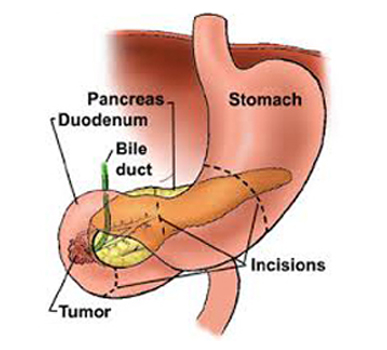
What is duodenal cancer?
Duodenal cancer is a rare form of cancer in the gastrointestinal tract. Duodenal cancer, though rare, can affect digestive process and prevent your body from absorbing necessary minerals needed to function properly. When cancer cells begin to form in the duodenum, tumors can block food from passing through the digestive tract.
We are the duodenal cancer treatment specialist centre in Bangalore.
Here, you will find information about signs and symptoms, causes and risk factors, types, diagnosis, staging and prevention about duodenal cancer.
Symptoms can be vague, which can make early diagnosis difficult. When food is unable to pass through the small intestine or when the body is unable to absorb necessary vitamins, you may experience a number of symptoms, which include:
Pain in the belly (abdomen)
Nausea and vomiting
Weight loss (without trying)
Weakness and feeling tired (fatigue)
Dark-colored stools (from bleeding into the intestine)
Low red blood cell counts (anemia)
Yellowing of the skin and eyes (jaundice)
A number of factors can increase a person's risk of developing cancer. Risk factors for developing duodenal cancer include:
Age: Duodenal cancer is more common in older people.
Inherited syndromes: People with certain inherited conditions have a higher risk of small intestine cancer (mainly adenocarcinoma): Familial adenomatous polyposis, Lynch syndrome, Peutz-Jeghers syndrome, MUTYH-associated polyposis, Cystic fibrosis.
Gastrointestinal disorders: Having Crohn's disease or celiac disease can increase the risk of cancer.
Colon cancer: Having had colon cancer can increase the risk of developing small intestine cancer or duodenal cancer.
Smoking and alcohol
Diet: Some studies indicate that people who eat a lot of red meat, salt, or smoked foods may have a higher risk of duodenal cancer.
We are committed to provide the best duodenal cancer treatment (in Bangalore).
Duodenal cancer can be classified into five major types:
Adenocarcinoma: This form of cancer affects the gland cells (that line the inside of the intestine) responsible for producing digestive chemicals, mucus, and other bodily fluids from internal organs.
Carcinoid tumors: These tumors are a type of neuroendocrine tumor (NET), and they tend to be slow growing. They are the most common type of small intestine tumor.
Lymphoma: These cancers start in immune cells called lymphocytes. Lymphomas can start almost anywhere in the body, including the small intestine.
Sarcoma: These are cancers that start in connective tissues, such as muscle. The most common sarcomas in the intestine are known as gastrointestinal stromal tumors (GISTs).
Some procedures to help detect cancer in your small intestine include:
Imaging tests like: Imaging tests use x-rays, magnetic fields, or radioactive substances to create pictures of the inside of the body. Imaging tests might be done for a number of reasons, including:
a. To help determine if symptoms are being caused by a tumor
b. To learn how far cancer has spread
c. To help determine if treatment is working
d. To look for signs that the cancer has come back
Computed tomography (CT) scan: A CT scan uses x-rays to make detailed cross-sectional images of your body. Unlike a regular x-ray, a CT scan creates detailed images of the soft tissues in the body.
Magnetic resonance imaging (MRI): Like CT scans, MRI scans show detailed images of soft tissues in the body. But MRI scans use radio waves and strong magnets instead of x-rays.
Endoscopy: Which involves examining the inside of your GI tract using a flexible tube with a small camera attached
Biopsy: Procedures such as endoscopy and imaging tests can find areas that look like cancer, but the only way to know for certain is to do a biopsy. In a biopsy, a piece of the abnormal area is removed and looked at under a microscope.
Blood tests
CAN-C: Well-known cancer centre for providing technologically advanced duodenal cancer treatment in Bangalore.
If you are diagnosed with duodenal cancer, it is necessary to figure out if it has spread, and if so, how far. This process is called staging. The stage of duodenal cancer describes the extent of the cancer in the body. It helps determine how serious the cancer is and how best to treat it.
The staging system most often used for duodenal cancer is the TNM system, which is based on 3 key pieces of information:
The extent (size) of the main tumor (T): How far has the cancer grown into the layers of the wall of the duodenum? Has the cancer reached nearby structures or organs?
The spread to nearby lymph nodes (N): Has the cancer spread to nearby lymph nodes?
The spread (metastasis) to distant sites (M): Has the cancer spread to distant parts of the body? The most common sites of spread are the liver and the inner lining of the abdomen (peritoneal cavity).
We are noted as one of the top centre for delivering exceptional duodenal cancer treatment in Bangalore.
As such at this time, there is no confirmed method or way to prevent most duodenal cancer. There are some factors that might increase the risk for the cancer, like smoking, drinking alcohol, and eating a diet that is high in red meats, so making healthier choices/changes in view of these might lower the risk.
"CAN-C: Providing top-quality treatment (in Bangalore) for duodenal cancer."
Make An Appointment Today
How Duodenal Cancer is treated?
If you've been diagnosed with a duodenal cancer, it is necessary to discuss your treatment options. It's important to know the benefits of each treatment option against the possible risks and side effects. The main types of treatment used for small intestine adenocarcinoma or duodenal cancer are: surgery, chemotherapy, radiation therapy.
Surgery: Surgery is typically the main treatment for duodenal cancer. For some people, it might be the only treatment they need. The type of operation will depend on a number of factors, including the size and location of the tumor, and whether a person has any serious health problems.
a. Segmental resection: This operation removes (resects) the segment of intestine that has the tumor, as well as some of the normal tissue on either side of the tumor. The 2 cut ends of intestine are then attached back together. Some nearby tissue containing lymph nodes is also removed.
b. Pancreaticoduodenectomy (Whipple procedure): This extensive operation can be used to treat cancers of the duodenum (the first part of the small intestine), although it is more often used to treat pancreatic cancer. It removes the duodenum, part of the pancreas, part of the stomach, and nearby lymph nodes.
c. Palliative surgery: If the cancer can't be removed completely because it has spread too far, surgery might still be a good option to help prevent or relieve some symptoms from the cancer. This is known as palliative surgery. Often, these operations are done to relieve a blocked intestine, to decrease pain, nausea, and vomiting, and allow the patient to eat normally.
We are expertise in duodenal cancer treatment in Bangalore using the latest techniques.
Radiotherapy: Radiation therapy uses high-energy radiation to kill cancer cells. It may be an option for those whose cancer cannot be removed completely with surgery and is causing problems such as pain or bleeding into the intestines. Radiation might also be used after surgery to try to kill any remaining cancer cells (known as adjuvant therapy). Radiation therapy is much like getting an x-ray, but the radiation is much stronger. The treatment itself is painless.
External-beam radiation therapy is the type of radiation used most often for duodenal cancer. For this treatment, radiation beams are aimed at the tumor from a machine outside the body.
We, CAN-C provide safest and most effective duodenal cancer treatment in Bangalore.
Chemotherapy: Chemotherapy (chemo) uses drugs to kill cancer cells. Often, these drugs are injected into a vein (IV) or given by mouth. They enter the bloodstream and can reach cancer cells anywhere in the body. It may be used in some situations:
a. If the cancer has spread (metastasized) to other parts of the body
b. After the tumor is removed with surgery (called adjuvant treatment),
c. As intraperitoneal chemotherapy for cancer that has spread to the inner lining of the abdomen (called the peritoneum).
Some of the chemo drugs that can be used include: Capecitabine, 5-fluorouracil (5-FU), Oxaliplatin, Irinotecan
5-FU is often given with a vitamin-like drug called leucovorin, which helps it work better.
Some of the drug combinations that seem to work in advanced small intestine cancer include: Capecitabine and oxaliplatin (called CAPOX), 5-FU and leucovorin with oxaliplatin (FOLFOX), 5-FU and leucovorin with irinotecan (FOLFIRI).
Our Doctors
Dr. Dinesh M G
Specialty: Surgical Oncologist & Laparoscopic Oncosurgeon
Dr. Dinesh M G, is an efficient surgeon specialized in oncology committed to the care and improvement of quality of life of cancer patients. His exceptional surgical skills, teamwork and knowledge are laudable. He is skilled in performing various minimal access oncologic surgeries and has mastered complex open surgeries in the field of oncology.
Completing MBBS from KIMS, Bangalore followed by MS - General Surgery from JJM Medical College, Davangere and M. Ch - Surgical Oncology from Kidwai Memorial Institute of Oncology, he has a Fellowship in Minimal Access Oncology from Basavatarakam Indo American Cancer Institute.

